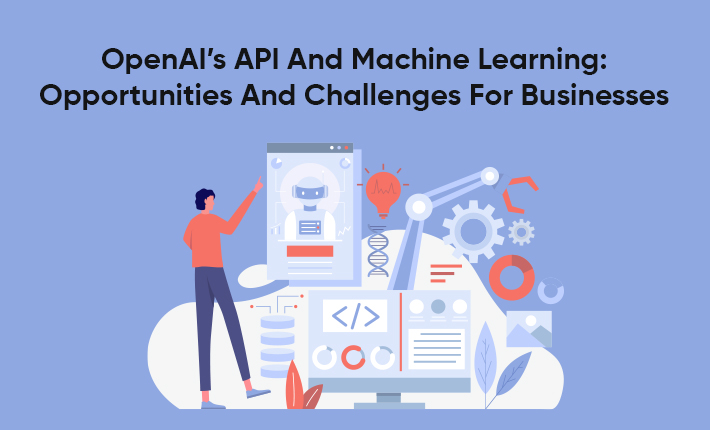Posted At: Jun 02, 2023 - 1,219 Views

OpenAI's API and machine learning present numerous opportunities and challenges for businesses. The availability of OpenAI's API allows businesses to tap into advanced natural language processing (NLP) capabilities, generate human-like text, and automate various tasks. However, businesses must also navigate challenges related to ethical considerations, data privacy, model biases, and the potential impact on human labor. Let's explore these opportunities and challenges in more detail:
Opportunities:
1. Natural Language Processing (NLP): OpenAI's API offers powerful NLP capabilities, enabling businesses to automate tasks such as drafting emails, generating content, answering customer queries, and providing personalized recommendations.
2. Improved Customer Experience: By leveraging OpenAI's machine learning capabilities, businesses can enhance customer experiences through chatbots, virtual assistants, and intelligent search functionalities. This can result in faster response times, increased personalization, and improved overall satisfaction.
3. Automation and Efficiency: OpenAI's API can automate repetitive and time-consuming tasks, freeing up human resources to focus on more complex and creative work. This can lead to increased productivity and cost savings for businesses.
4. Content Generation: Businesses can utilize OpenAI's API to generate high-quality, human-like content for marketing materials, social media posts, product descriptions, and more. This can streamline content creation processes and maintain consistent brand messaging.
5. Decision Support: OpenAI's machine learning models can assist businesses in analyzing large volumes of data, identifying patterns, and making data-driven decisions. This can enable businesses to gain valuable insights, improve forecasting, and optimize operations.
Challenges:
1. Ethical Considerations: The use of AI and machine learning raises ethical concerns, such as the responsible use of technology, potential biases in training data, and the impact on privacy and security. Businesses must ensure they use AI in a fair, transparent, and accountable manner.
2. Data Privacy and Security: Businesses need to handle user data responsibly and comply with data protection regulations. The use of machine learning models may require access to sensitive data, and businesses must take appropriate measures to protect user privacy and secure data storage.
3. Model Biases and Fairness: Machine learning models can inadvertently inherit biases present in the training data, which can result in biased outcomes or discriminatory behavior. Businesses must actively address these biases, conduct rigorous testing, and employ techniques to mitigate potential bias.
4. Human-Labor Displacement: The automation potential of OpenAI's API raises concerns about job displacement. While AI can augment human capabilities, businesses must be mindful of potential impacts on employment and consider reskilling and upskilling initiatives.
5. Transparency and Explainability: As AI systems become more complex, the lack of interpretability and explainability can hinder trust and adoption. Businesses may face challenges in explaining the decision-making processes of AI systems, particularly in regulated industries or critical applications.
6. Overreliance on AI: Relying solely on AI systems without proper human oversight can lead to errors, misinterpretations, or unexpected outcomes. Businesses should carefully balance the use of AI with human judgment to ensure accurate and responsible decision-making.
To navigate these opportunities and challenges effectively, businesses should approach AI and machine learning with a thoughtful strategy. This includes investing in ethical AI practices, establishing governance frameworks, promoting transparency and fairness, ensuring proper data handling, and fostering a human-AI collaboration mindset.
Additionally, staying informed about evolving AI regulations and engaging in ongoing dialogue with stakeholders can help businesses navigate the complex landscape of AI and machine learning while maximizing the benefits they offer.
